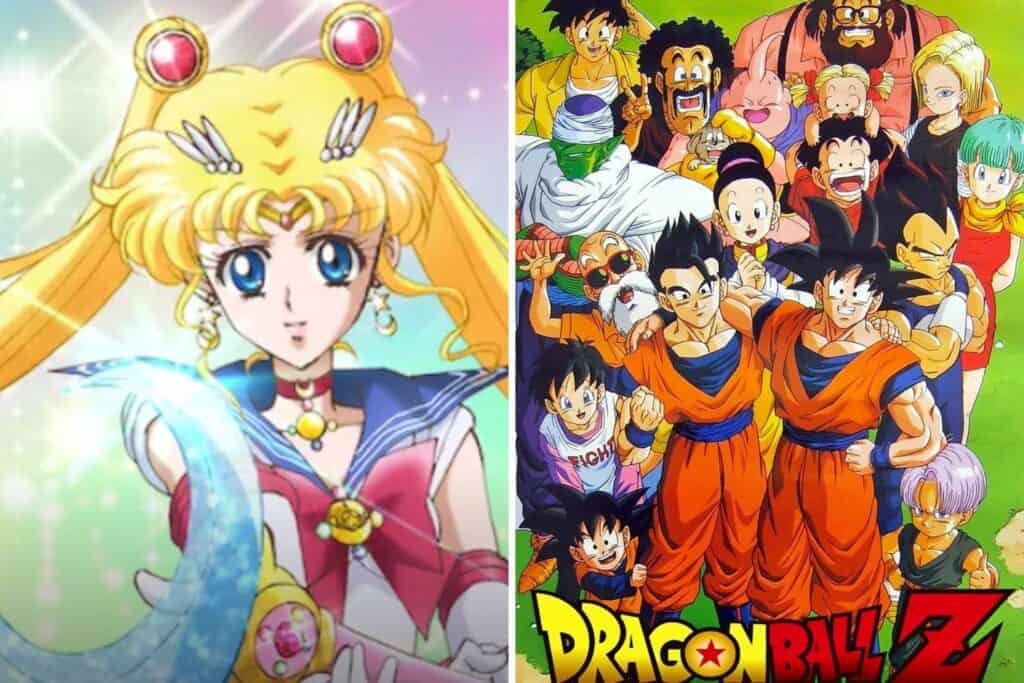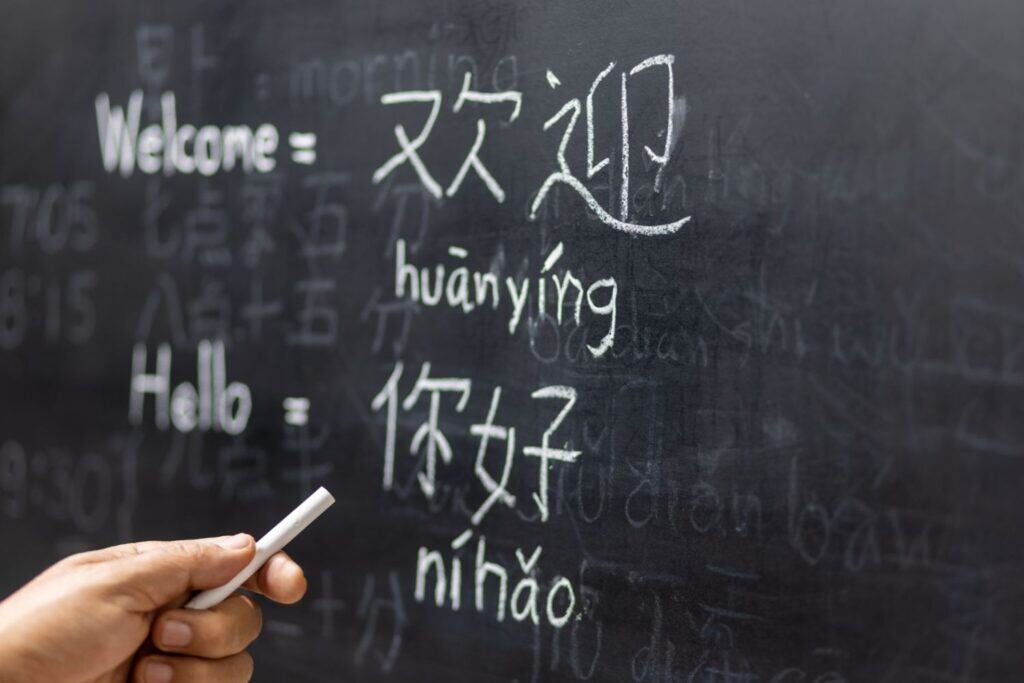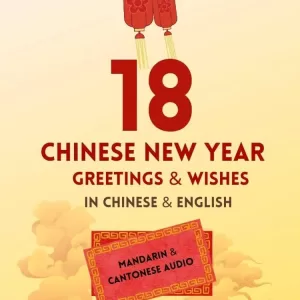
Walking through the streets of Hong Kong with my cousins and relatives, they are amazed, saying, “You’ve lost your accent!” During these family visits, people often wonder how my siblings and I managed to maintain fluency in Cantonese Chinese while growing up in Canada.
In this post, I’ll share my personal journey and offer insights for parents, teachers, and anyone interested in keeping a minority language alive. From childhood memories to practical tips, let’s explore fun and effective ways to stay fluent in Cantonese Chinese together!
Related: 21 Tips to Teach Minority Languages & Motivate Your Kids
My Background

When I was 7, my family and I moved to Canada from Hong Kong. I have two younger siblings. At that time, my English wasn’t very good and I had a strong accent. But even then, I had already finished grade 1 in Hong Kong and could read and write a lot of Chinese characters.
My Chinese Level
Here’s a straightforward assessment of my current progress in Chinese.
Listening: I can comprehend nearly all of news reported or radio. It’s like listening to a friend sharing stories with me.
Speaking: I can easily share my ideas with someone from Hong Kong who speaks the language fluently. I don’t have an accent, though there might be some slang jokes that I might not understand. It’s all good! We can still have a great conversation and understand each other.
Reading: I can read Chinese newspaper article and understand around 65% of it.
Writing: I’m not the best at writing since I don’t get much practice, especially since I don’t need to write in Chinese often here in Canada. But there was a time when I used to write letters to my friends and cousins back in Hong Kong before the internet became popular. It was a super fun way to stay connected!
Read: 22 Fun and Interactive Ways to Teach Kids Writing Chinese Characters
9 Secrets to Maintaining Fluent in Cantonese Chinese
1. Speak Cantonese at Home

My parents aren’t very fluent in English, so we mostly speak Cantonese with them. As the oldest child, I end up being their translator for appointments, outings, and stuff like that. It’s pretty cool because it helps me keep up my language skills!
2. Watch Cantonese Media

I watched so many Cantonese media including dubbed versions.
These include:
- Cantonese dubbed anime
- TVB dramas and shows
- Movies
Related: 313+ Movies & Shows to Prepare for Disney World (2023)
Cantonese Dubbed Anime

Watching Cantonese media was a huge part of my childhood! It all started with Japanese anime like Sailormoon and Dragonball (yeah, I was a super fan!). I was in love with anime back then, and I still enjoy it now.
At the time, the later episodes of Sailormoon and Dragonball weren’t available in Canada yet. They hadn’t been dubbed in English, so I kept bugging my mom to borrow the Cantonese dubbed versions because they had the latest episodes of Sailormoon and Dragonball.
By the way, Sailor Moon Crystal is on Netflix, but unfortunately, they don’t have it in Chinese dub.
TVB
TVB has played a big part of my childhood. There were just too many that were my favorite! I would still rewatch them sometimes on YouTube just for memories and they are still so good! Boy, am I becoming like my parents and grandparents now?
Here are some of my favorite ones from 1995 and on. I have found some YouTube links for the below drama:
Healing Hands (妙手仁心) 1998
War of the Genders (男親女愛) 2000
The Return of the Condor Heroes (神鵰俠侶)
The Heaven Sword and Dragon Saber (倚天屠龍記)
Chinese Movies
Stephen Chow movies were seriously my favorite! I remember my dad used to take me to the movie theaters to watch his movies. They were so good and funny that I still watch them with my husband. They’re just amazing!
Here are some of my Stephen Chow favorite movies:
Tricky Brains Ultimate Trickster(整蠱專家) 1991
Fight Back to School (逃學威龍) 1991
The God of Cookery (食神) 1996
All for the Winner (賭聖) 1990
Flirting Scholar (唐伯虎與秋香) 1993
3. Read Chinese Materials
Let me share with you the Chinese materials I enjoyed the most during my childhood:
- Chinese comic books
- Magazines
- Chinese subtitles
Related: Sagebooks Chinese for Kids Beginner 500 Review – Is It Worth a Try?
Check out these amazing online bookstores:
- Kozzi.ca (Canada & US)
- Yuto.ca (Canada & US)
- Chinese Book Online (Global)
- Jojo Learning (Global)
- Yo! Baby (Global)
Chinese Translated Japanese Comic Books
I loved Anime and Manga (Japanese comic books) so much! Chinese translated manga was my go-to when the anime wasn’t finished yet. Reading the manga allowed me to dive deeper into the story!
In high school, I joined online manga groups where I helped edit raw scans and translate them into Chinese. It was awesome to share the joy of reading manga chapter by chapter with others.
Romance manga was my absolute favorite!
Chinese Magazines

I was really into Hong Kong celebrities when I was in high school. I loved them so much that I would use my allowance to buy the weekly Yes! magazine and read every page, especially the ones that featured the celebrities I admired.
Chinese Subtitles
I used to be really into Taiwanese drama back in high school, even though I didn’t know much Mandarin. So whenever I watched Taiwanese drama, I would read the Chinese subtitles. One of my all-time favorites, of course, is Meteor Garden! It’s just the best!
Fun Story: My sister kept rewatching Meteor Garden because she could only understand about 65% of the Chinese subtitles. But after watching it for the 10th time, she started getting the hang of listening to Mandarin at a normal pace. Pretty cool, right? 😄
4. Chinese Music
I adore music! I simply love listening to it, playing instruments, and singing along! It’s such an amazing way to learn Chinese!
Chinese Songs
I used to collect CDs like crazy! I loved listening to Cantonese and Taiwanese Mandarin songs.
Some of my all-time favorite Cantonese singers were Nicholas Tse (謝霆鋒), Twins, Eason Chan (陳奕迅), and Joey Yung (容祖兒).

When it came to Taiwanese singers, I couldn’t get enough of F.I.R., Jolin Tsai (蔡依林), a-Mei (張惠妹), Jay Chou (周杰倫).

Karaoke
Going to Chinese Karaoke used to be such a popular thing when I was in high school. We’d all hop on a bus and head to the Pacific Mall, a Chinese mall in Toronto, after school on Fridays. We’d book a room, take turns singing with the microphone, and have a blast for hours. It was an awesome way to learn Chinese, especially Mandarin!
The screen would display Chinese subtitles at the bottom, so you could sing along with the audio. At first, I always sang with the audio, but with enough practice, I got to a point where I could turn it off and still sing confidently!

5. Chinese Radio
My mom always puts on the local Cantonese radio every morning and whenever we’re in the car. It’s pretty much all we listen to, whether we like it or not. Sometimes I zone out, but most of the time I pick up quite a bit of vocabulary from the radio. It’s interesting how my mom does it just for fun, but we kids end up benefiting from it.

Read: 16 Best Podcasts for Kids in 2023: English and Chinese Options
6. Chinese School
My parents signed us up for Saturday Chinese school. My little brother didn’t want to go because he didn’t enjoy it. As a result, his Chinese fluency isn’t as good as mine and my sister’s. But hey, he can still speak fluently, just with a little accent.

Do you know why we decided to go? Because our friends were going too! It was so much fun to go together! Did it help? I would say yes, although I still couldn’t read novels because I didn’t take advanced Chinese courses. But at the end of the day, I could read, write, and speak Chinese!
7. Bond with Friends that Speak Chinese

I grew up in this awesome city called Richmond Hill in Ontario, Canada. It’s a place where most people are Chinese, which makes it super easy to find friends who speak the same language as me.
And guess what? I still hang out with my high school best friends now and then, and we even go on girls’ trips together! When we’re together, we speak Cantonese and we wouldn’t have it any other way!
We have so much in common, from our culture to our families, and they make me feel like I belong. There’s just so much we can relate to!
Fun Fact: Many of my Cantonese friends learned Mandarin from their Taiwanese friends. Unfortunately, I’m still not fluent in Mandarin myself. I guess my language skills aren’t as good as those of my friends around me. But hey, we’re all learning and growing together!
8. Travel to Hong Kong

Going back to Hong Kong is always an exciting trip! We don’t go back often because it can be quite costly. But when we do, it’s an instant boost in learning the language, understanding the culture, and loving every bit of it! Seeing our relatives and having huge gatherings feels so nice!
Visiting other Asian countries is also super interesting. It’s amazing to see the similarities and differences between cultures. It broadens my perspective and helps me appreciate different ways of life. Being able to communicate in Chinese allows me to connect with locals and fully immerse myself in their culture.
Related: How to Travel with Kids in China to Cultivate Chinese Interest?
9. Love for Chinese Culture
I believe that my fluency in Chinese today, and my desire to pass it on to my children, stems from my deep love for the Chinese culture. Everything from the media, the food, the holiday celebration, and the joy of visiting my home country, to the language itself, has become an integral part of who I am. It’s not just something I’m learning!
To be honest, I still have so much to discover about Chinese food in general. Every time I go back to Asia and explore different parts of the continent, I encounter new flavors that surpass anything I’ve tasted in the Western world. It’s amazing!
Witnessing my children embrace Asia’s culture and cuisine while traveling with us brings me immense joy and gratitude. It truly reinforces my belief that if our kids develop a love for the Chinese culture, they will naturally be motivated to learn the language too.
Check out: 21 Traditional Chinese Toys Your Kids Will Love: Learning Made Fun
Wrapping Up the Secrets to Staying Fluent in Cantonese Chinese

In conclusion, keeping up with Chinese isn’t just about studying and memorizing. It’s about wrapping our arms around the beautiful culture, savoring the yummy foods, and sharing stories with family and friends! Whether it’s through songs, movies, or heartwarming visits back home, every little bit counts in keeping the language alive in our hearts and minds. Remember, when we show our kids how much fun and exciting learning Chinese can be, they’ll want to join in on the adventure too! Keep it fun, keep it regular, and most of all, keep it real with the love for the richness that the Chinese culture brings to our lives.
Check out: 16 Fun Ways to Teach Your Child Chinese




